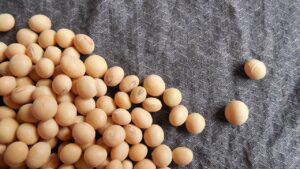Part V: Path Forward
Aside from the CBD boom, analysts say farmers have a real reason to grow hemp. There’s a need to spur agriculture’s commodity markets forward, and hemp might be a trigger.
“There are economic reasons the United States should be involved in hemp markets,” says Erica Stark of the National Hemp Association. “Growers have been struggling, and it’s gotten worse with soybean tariffs. Hemp could fit the bill.”
Kevin Latner, vice president of marketing for the National Industrial Hemp Council, believes because commodity prices are low and farmers aren’t making money, they’re anxious to try something new.
Stark says hemp could even rival soybean production.
“Hemp won’t replace any other crop, but it’ll fit into a good rotation with other crops,” she says. “Hemp, as it grows, should bring up the market of soy.
“Hemp is more nutritious than soy, and you can use it in similar ways. You can make hemp milk like soy milk; you can use the seed cake in baking powder and proteins; and eventually, it would make good animal feed. In my mind, hemp is more versatile than soy, but not a replacement.”
With the passage of the 2018 Farm Bill, industrial hemp is now eligible for all USDA programs.
Michael Bowman, founding chair of the National Hemp Association and a co-founder of First Crop, says these programs are essential before farmers can really jump in.
“We must get insurance and banking in place,” he says. “The banking community is not really sure about this. We are not going to get out of the gate without having those problems solved.”
Some experts have suggested production could reach 50 million acres. But we’re not near there. Bowman hopes to see acreage reach 1 million.
“Some activists have created an irrational exuberance about where we are today,” he says. “We are at the starting gate. Now the hard work of infrastructure, market development and branding begins.”
Latner agrees.
“Looking back, it is not speculation to say that new technology will develop to make hemp a major crop,” Latner says. “It doesn’t mean it will be easy.
“Some people will go out of business. There will be bumps in the road and prices will fluctuate, but that is the path of American agriculture.”
He adds that land-grant universities have an incredible infrastructure of agricultural research and Extension to test new varieties, production processes, harvesting and processing.
“All of the major row crops and many specialty crops have benefited from this infrastructure,” Latner says. “Hemp will benefit too.”













